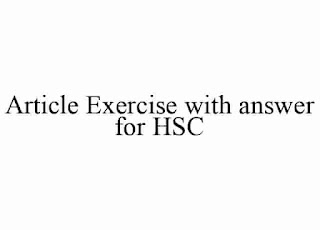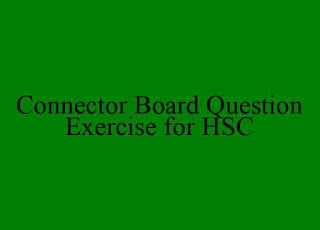Rules of Narration
Passage narration means a short passage of conversation between two persons in the form of direct speeches. There are some different rules of changing passage narration from direct speeches to indirect speeches.
👉1. After reading the passage attentively, at first you have to identify the speaker, the listener and mode of every sentence.
👉2. Always put reporting verb at first place of the sentence and follow the five changes.
Direct: “I am ill now,” he said to me.
Indirect: He told me that he was ill then.
3. In case of frequent speech of a speaker
Assertive Sentence: told, added, also added, further added
Interrogative Sentence: asked, also asked, again asked, further asked
Imperative Sentence: and Requested /and ordered to
Optative Sentence: and prayed/and wished that
Exclamatory Sentence: and exclaimed in joy that/ in grief that
A. Direct: She said to me, “I am going to school. I will return soon.”
Indirect: She told me that She was going to school and added that he would return soon.
B. Direct: She said to me, “How are you? Have you brought the book with you?”
Indirect: She asked me how I was and also asked if I had brought the book with me.
4. Yes ⸻ Subject + replied in the affirmative that/agreedNo ⸻ Subject + replied in the negative that/disagreed/denied
A. Direct: She said, “Yes, I will help.”
Indirect: She replied in the affirmative that she would help.
B. Direct: She said, “No, I can do this.”
Indirect: She replied in the negative and said that She could do that.
5. Sir/Madam ⸻with respect/respectfully/politely Or, Addressing as Sir/Madam
Direct: Matthew said, “Sir, I should follow.”
Indirect: Matthew respectfully said that he should follow.
6. By Allah/ by God/ by Jove ⸻sentence will start with ⸻ Swearing by Allah/ God/ Jove/ Love
Direct: “By Allah, she replied, “I have left it.”
Indirect: Swearing by Allah, she replied that she had left it.
7. Sorry ⸻ apologized
A. Direct: Matt said to him, “Sorry, I cannot agree.”
Indirect: Matt apologized him that he could not agree.
B. Direct: Matt said to him, “Sorry, I can’t agree.”
Indirect: Matt told him that he was sorry and he couldn’t agree.
C. Direct: Olivia said to me, “Sorry, I can’t help you.”
Indirect: Olivia said to me that she was sorry and added that she couldn’t help me.
Or: Olivia apologized that she couldn’t help me.
8. Hello ⸻ sentence will start with⸻ Drawing attention
A. Direct: I said, “Hello Ricky, how are you?”
Indirect: Drawing attention, I asked Ricky how he was.
B. Direct: Elizabeth said to me, “Hello, can I help you?”
Indirect: Drawing attention, Elizabeth asked me if she could help me.
Or: Elizabeth drew attention and asked me if she could help me.
9. Excuse me ⸻ sentence will start with ⸻ Subject + begged pardon
A. Direct: I said to Williamson, “Excuse me, how are you?”
Indirect: I begged pardon and asked Williamson how he was.
Or: Begging pardon, I asked Williamson how he was.
B. Direct: He said to me, “Excuse me, can I help you?”
Indirect: Begging pardon, he asked me if he could help me.
Or: He begged pardon and asked me if he could help me.
10. But ⸻ with disappointment/expressed with dissatisfaction
A. Direct: He said, “But I try to avoid.”
Indirect: He expressed with dissatisfaction that he tried to avoid.
Or: With disappointment, he said that he tried to avoid.
Or: With dissatisfaction, he said that he tried to avoid.
B. Direct: Eva said, “But I try to avoid.”
Indirect: But Eva said that she tried to avoid.
11. Well ⸻ sub + appreciated it/with appreciation
A. Direct: Nicholas said to him, “Well, I agree.”
Indirect: Nicholas appreciated it that he agreed.
Or: With appreciation, Nicholas told him that he agreed.
B. Direct: She said to me, “Well, I can help you.”
Indirect: With appreciation, she said to me that she could help me.
Indirect: She appreciated it that she could help me.
12. So ⸻ that is why
A. Direct: She said to me, “I am unwell. So I shall not go to school.”
Indirect: She told me that she was unwell and that is why she would not go to school.
13. The phrase except speaker and listener in a reporting verb will be completely unchanged and takes place before reporting verb.
Direct: Turning towards me, she said to me, “Don’t shout.”
Indirect: Turning towards me, she forbade me to shout.
14. If there is reference of address in reported speech, indirect speech will start with addressing him/her/them as…..’’.
A. Direct: James said to them, “Friends, let us enjoy.”
Indirect: Addressing them as friends, James proposed that they should enjoy.
B. Direct: He said, ‘Eva, do not quarrel.’
Indirect: He forbade Eva to quarrel.
15. Reporting verb will be unchanged except said to. (replied/informed/added/stated/ remarked / asserted /assured/pleaded/remarked/ reported /reminded/complained/muttered/ uttered)
Direct: She replied/muttered/uttered, “She had done the job.”
Indirect: She replied/muttered/uttered that she had done the job.
16. In spite of being assertive sentence, if the symbol is (?) question mark, then sentence will be started with “Being surprised” and follow the rules of interrogative sentences.
A. Direct: Emily said to him, “You forgot who I am?”
Indirect: Being surprised, Emily asked him if he had forgotten who she was.
B. Direct: Emily said to me “You are angry with me?”
Indirect: Being surprised she asked me if I was angry with her.
18. If there is a tag question after reported speech....
A. Direct: Harry said to me, “You are going to the playground, aren’t you?”
Indirect: Harry asked me if it was true that I was going to the playground.
B. Direct: Noah said to me, “You look smart, don’t you?”
Indirect: Noah asked me if it was true that I looked smart.
C. Direct: Liam said to me, “I will attend the party, won’t I?”
Indirect: Liam asked me if it was true that he would attend the party.
19. If there is no speaker and listener in Reported Speech
Direct: “Where are you going now?” “I am going to market.”
Indirect: The speaker asked the listener where he was going then. The listener replied that he was going to market.



